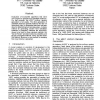Free Online Productivity Tools
i2Speak
i2Symbol
i2OCR
iTex2Img
iWeb2Print
iWeb2Shot
i2Type
iPdf2Split
iPdf2Merge
i2Bopomofo
i2Arabic
i2Style
i2Image
i2PDF
iLatex2Rtf
Sci2ools
IJCAI
1997
1997
Hidden Gold in Random Generation of SAT Satisfiable Instances
Evaluation of incomplete algorithms that solve SAT requires to generate hard satisfiable instances. For that purpose, the kSAT uniform random generation is not usable. The other generators of satisfiable instances generate instances that are not intrinsically hard, or exhaustive tests have not been done for determining hard and easy areas. A simple method for generating random hard satisfiable instances is presented. Instances are empirically shown to be hard for three classical methods: the "Davis-Putnam" procedure (which is complete), and the two incomplete methods: GSAT and the Break Out Method. Moreover, a new method for escaping from local minima is presented.
Hard Satisfiable Instances | IJCAI 1997 | IJCAI 2007 | Satisfiable Instances | Uniform Random Generation |
Related Content
| Added | 01 Nov 2010 |
| Updated | 01 Nov 2010 |
| Type | Conference |
| Year | 1997 |
| Where | IJCAI |
| Authors | Thierry Castell, Michel Cayrol |
Comments (0)

